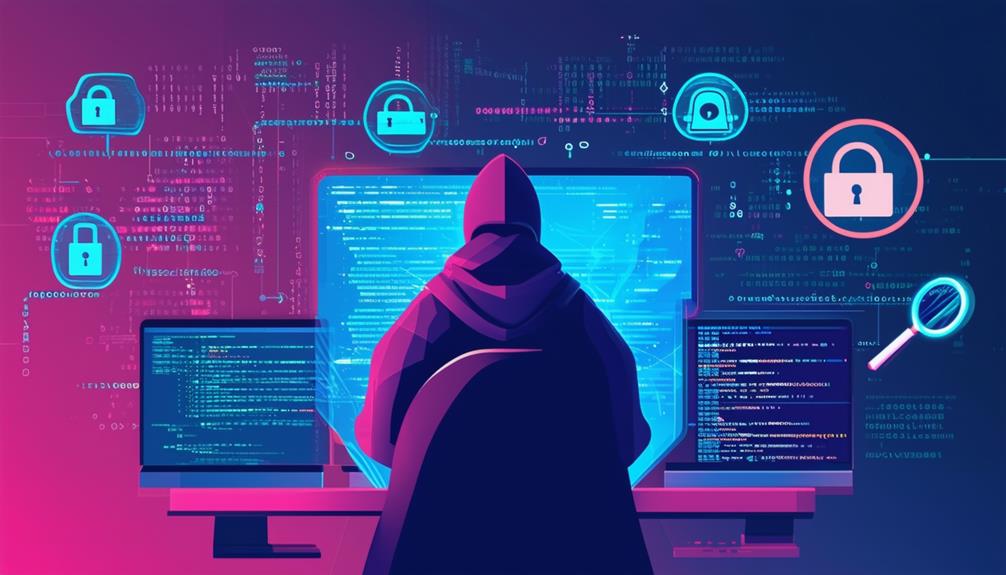Discover ethical hacking essentials from experts. Learn to detect vulnerabilities and fortify systems for cybersecurity. Explore network reconnaissance, security testing, and hacker types like white hat hackers. Gain insights into ethical hacking's essential role in safeguarding sensitive data. Uncover practical applications in security testing, auditing, and incident response. Open up career prospects in penetration testing and security analysis. Ethical hackers are important in protecting digital assets and staying ahead of cyber threats. Master the lucrative field with a median wage of $102,600. Embrace the world of ethical hacking through expert guidance and deep insights into this dynamic field.
Key Takeaways
- Ethical hacking tutorials cover network reconnaissance and vulnerability assessments.
- Learn system exploitation techniques and security testing methodologies.
- Understand the importance of ethical hacking in fortifying cybersecurity measures.
- Explore career opportunities as Penetration Testers and Security Analysts.
- Gain insights from experts to enhance skills in ethical hacking and cybersecurity.
Ethical Hacking Fundamentals
To explore the world of Ethical Hacking Fundamentals, it is essential to understand the foundational principles that underpin the practice of ethical hacking. Ethical hacking involves identifying vulnerabilities in computer systems and networks to enhance their security. Ethical hackers, also known as white hat hackers, employ system exploitation and network hacking techniques to uncover potential weaknesses before malicious hackers can exploit them.
By conducting network reconnaissance, system vulnerability assessments, and security testing, ethical hackers play a critical role in fortifying systems against cyber threats.
These skilled professionals are instrumental in safeguarding sensitive data and preventing unauthorized access to confidential information. Understanding the nuances between different types of hackers, such as black hat hackers who engage in malicious activities and gray hat hackers who fall in between, is important in the domain of ethical hacking.
Ethical hacking courses cover topics like network hacking techniques, system exploitation, and web application security to equip individuals with the knowledge and skills needed to combat cyber threats effectively.
Importance of Ethical Hacking

The significance of ethical hacking lies in its pivotal role in fortifying cybersecurity measures and protecting digital assets from potential threats. Ethical hackers use various security tools and their specialized skills to identify weaknesses in security systems, conducting penetration testing to simulate cyber attacks and uncover vulnerabilities. This proactive approach allows organizations to enhance their cybersecurity practices and fortify their defenses against potential security risks.
By leveraging ethical hacking skills, businesses can stay one step ahead of malicious actors and safeguard sensitive data effectively.
Ethical hackers play an essential role in identifying vulnerabilities in computer systems.
Penetration testing helps simulate cyber attacks to assess system security.
Ethical hacking skills are vital for protecting digital assets and ensuring data security.
Main Applications of Ethical Hacking

Ethical hacking finds crucial applications in security testing, penetration testing, vulnerability assessment, security auditing, and incident response.
These practices play an important role in identifying vulnerabilities, testing security controls, and improving overall security measures within computer systems and networks.
Key Ethical Hacking Uses
Exploring the primary applications of hacking for ethical purposes reveals its pivotal role in fortifying digital security measures. Ethical hacking, also known as penetration testing, vulnerability assessment, and security auditing, serves vital functions in safeguarding systems against malicious attacks.
- Penetration testing involves simulated cyberattacks to evaluate the security of a system, identifying weaknesses before malicious hackers can exploit them.
- Vulnerability assessment focuses on systematically discovering, classifying, and prioritizing security vulnerabilities, enabling organizations to address critical issues promptly.
- Security auditing employs ethical hacking techniques to assess the effectiveness of security controls, ensuring that systems meet compliance requirements and industry standards.
These applications are essential for organizations to proactively defend against cyber threats, emphasizing the importance of ethical hackers, like Certified Ethical Hackers, who utilize tools such as Kali Linux to enhance cybersecurity defenses and protect sensitive information from unauthorized access.
Impact on Security
Playing a fundamental role in enhancing cybersecurity measures, ethical hacking demonstrates its impact on security through its main applications.
Security testing is a primary function of ethical hacking, focusing on uncovering vulnerabilities within computer systems, networks, and applications.
Penetration testing, a key application, involves simulated attacks to identify weaknesses and test security controls, ensuring robust protection against malicious intrusions.
Vulnerability assessment is another critical aspect where potential weaknesses are pinpointed and their severity evaluated, enabling proactive security measures.
Security auditing, carried out by ethical hackers, assesses the efficacy of security controls and provides recommendations for enhancements.
Additionally, incident response plays an essential role in responding to security breaches, investigating incidents, determining root causes, and suggesting preventative measures to fortify defenses.
Practice With Ethical Hacking Quiz

Engage in the practical application of cybersecurity knowledge through the Ethical Hacking Quiz. This quiz is a valuable tool for individuals looking to enhance their skills in ethical hacking and cybersecurity. Here are some key points to keep in mind:
- Comprehensive Coverage: The quiz explores various aspects of ethical hacking, including penetration testing, system vulnerabilities, and network security, providing a holistic view of cybersecurity practices.
- Self-Assessment: By taking the quiz, participants can evaluate their understanding of hacking techniques and security measures, identifying areas for improvement and further study in the field.
- Skill Enhancement: The quiz offers a practical way to reinforce learning and enhance expertise in ethical hacking, allowing individuals to apply theoretical knowledge to real-world scenarios effectively.
Career Opportunities in Ethical Hacking

Career opportunities in ethical hacking offer promising job prospects, with roles like Penetration Testers and Security Analysts experiencing significant growth in the cybersecurity field.
The demand for skills in hacking and cybersecurity is on the rise, making expertise in these areas highly valued by organizations seeking to protect their digital assets.
As the landscape of cyber threats evolves, professionals in ethical hacking play an essential role in safeguarding sensitive information and maintaining secure systems.
Job Prospects in Hacking
What are the job prospects for individuals pursuing a career in ethical hacking?
The field of Ethical Hacking offers a wide range of opportunities for professionals interested in cybersecurity. Here are some key roles and prospects within this industry:
- Penetration Tester: Individuals in this role assess the security of computer systems, networks, and applications to identify vulnerabilities.
- Security Consultants: These professionals analyze risks, develop security policies, and provide essential cybersecurity training to organizations.
- Security Analysts: Responsible for monitoring security systems, investigating incidents, and managing security tools to guarantee a robust defense against cyber threats.
With a 33% projected growth rate for information security analysts, the demand for cybersecurity experts continues to rise. Cybersecurity Engineers are also in high demand, designing, implementing, and maintaining security solutions. Ethical Hackers enjoy a median annual wage of $102,600, with reported job satisfaction at 77% in 2021.
Growth in Cybersecurity
Amid the rapidly evolving landscape of cybersecurity, opportunities in ethical hacking are flourishing. The demand for skilled professionals in the cyber security workforce is on the rise, with a projected 65% growth needed globally according to (ISC)².
Information security analysts are also expected to see a significant 33% growth, offering ample career prospects in this field. The median annual wage for cyber security professionals stands at an attractive $102,600, making it a lucrative career choice. Moreover, job satisfaction among cyber security professionals is high, with 77% reporting contentment in their roles in 2021.
Participating in hacking competitions such as DEF CON and Google's CTF can provide valuable opportunities to showcase ethical hacking skills and network with other experts in the field. As the cybersecurity industry continues to expand, individuals with strong ethical hacking skills are in high demand, making this an opportune time to explore a career in this dynamic and rewarding field.
Skills in High Demand
Experiencing a surge in demand, ethical hacking professionals with specialized skills are currently sought after in various cybersecurity roles. In the fast-evolving world of cyber security, ethical hackers must constantly learn Ethical Hacking to stay ahead and secure lucrative career opportunities.
With ethical hacking being legal and essential for protecting organizations from cyber threats, individuals interested in a career in cybersecurity can explore roles such as Security Analyst, penetration tester, and Security Consultant. These positions offer competitive salaries, with the Penetration Tester role reporting a median annual wage of $102,600.
Additionally, the global cybersecurity workforce is in need of skilled professionals, with a 65% growth projected for Security Consultants. As the demand for security training increases, individuals can tap into this growing field by acquiring the necessary skills to thrive in the dynamic landscape of cybersecurity.
Learn From Ethical Hacking Experts

Benefit from the wealth of knowledge and expertise possessed by ethical hacking experts as you commence your learning journey in this field. Taking an Ethical Hacking Course allows you to learn directly from seasoned professionals, acquiring essential tools and techniques to identify vulnerabilities in systems.
These experts provide valuable insights through real-world examples and case studies, offering guidance on best practices and emerging trends in ethical hacking. By practicing ethical hacking under their mentorship, you can enhance your skills and knowledge effectively.
Learning from these experts not only equips you with practical know-how but also instills a deep understanding of the industry standards and strategies that are pivotal in this field. Their years of experience and hands-on approach to teaching ensure that you are well-prepared to navigate the complexities of ethical hacking with confidence and proficiency.
Invest in your education by tapping into the expertise of ethical hacking professionals to excel in this dynamic and high-demand field.
Ethical Hacking Course Details

As we shift our focus to the specifics of the Ethical Hacking Course, it is imperative to understand the foundational elements and practical aspects integral to this all-encompassing program. The course, led by esteemed instructors Juan E. Galvan and Anthony Timbers, explores essential topics such as network reconnaissance and web application testing.
Here's a glimpse of what the course entails:
- Thorough coverage of network hacking techniques.
- In-depth investigation of system access and exploitation methods.
- Hands-on training in website hacking and web app penetration testing.
Students can anticipate a dynamic learning experience with a blend of theoretical knowledge and practical examples. The course structure includes engaging video sessions, interactive quizzes, and challenging interview questions to enhance learning.
Designed specifically for beginners in cybersecurity, this course equips individuals with the necessary skills to navigate the world of ethical hacking effectively.
Frequently Asked Questions
Can You Teach Yourself Ethical Hacking?
Yes, you can teach yourself ethical hacking through online courses, tutorials, and practice labs. Utilize resources like ethical hacking books, video sessions, and hands-on exercises. Platforms like Cybersecurity Guide and certifications like Certified Ethical Hacker from EC-Council provide structured learning paths.
What Is the Best Learning Path for Ethical Hacking?
To excel in ethical hacking, mastering networking fundamentals, setting up hacking labs, and becoming proficient in Linux and scripting languages are essential. Additionally, knowledge of JavaScript, Python, SQL, and resources like Cybersecurity Guide, edX, and Boot Camps are indispensable.
Which Is the Best Website to Learn Ethical Hacking?
When it comes to learning ethical hacking, Cybrary stands out as a top choice due to its extensive courses, practical examples, and hands-on labs. Their platform offers a thorough learning experience tailored for individuals looking to excel in this field.
What to Learn Before Learning Ethical Hacking?
Before delving into ethical hacking, it is essential to grasp fundamental networking concepts, familiarize oneself with operating systems and command line usage, acquire proficiency in programming languages, understand security threats, and have experience with cybersecurity tools.
Conclusion
To summarize, ethical hacking serves as a valuable tool in identifying and addressing cybersecurity vulnerabilities. By learning from experts in the field, individuals can acquire the necessary skills to protect digital assets and safeguard data privacy.
The practice of ethical hacking offers numerous career opportunities and a chance to make a positive impact in the field of cybersecurity. Embracing this valuable skill set can lead to a rewarding and fulfilling career in the ever-evolving world of technology.









